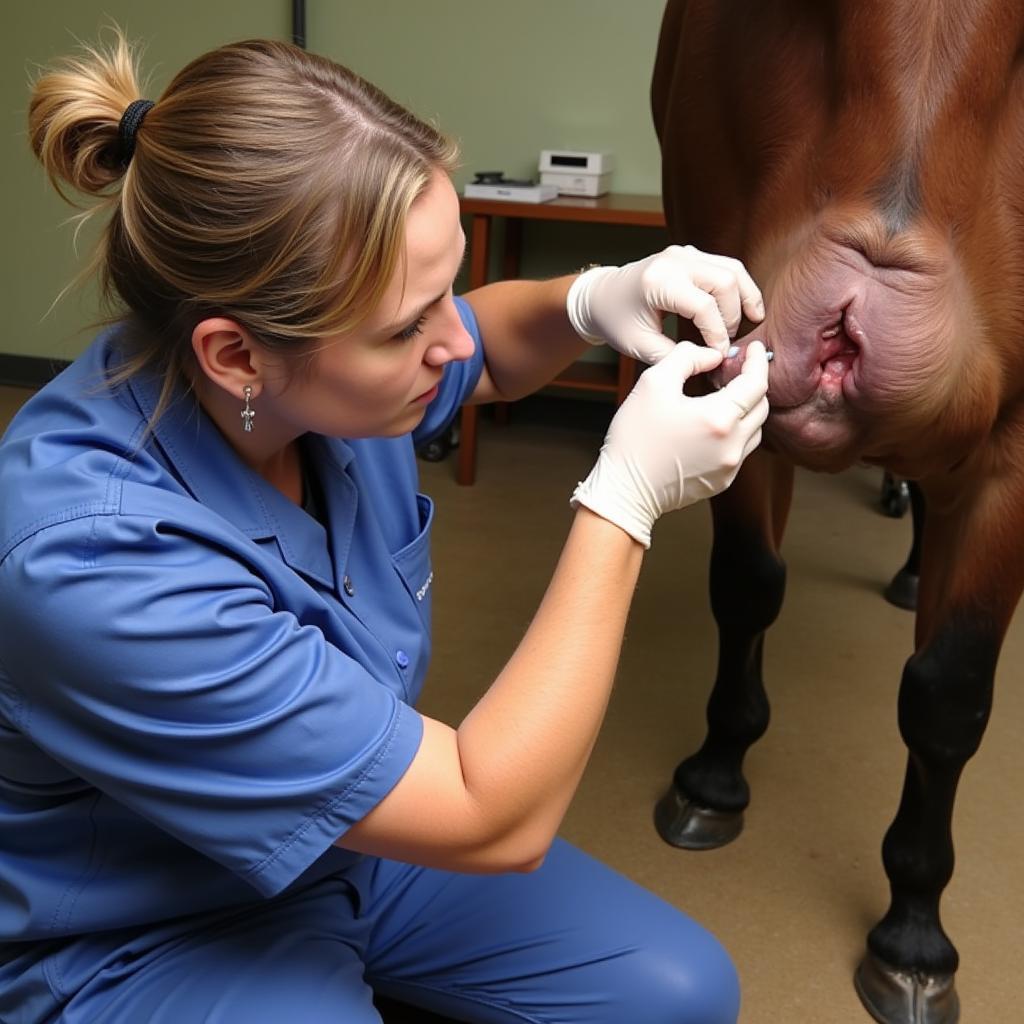Pigeon fever, also known as dryland distemper or pigeon breast, is a bacterial infection that can cause abscesses in horses. Understanding how horses contract this infection is crucial for prevention and early intervention.
Transmission of Pigeon Fever in Horses
Pigeon fever is caused by the bacterium Corynebacterium pseudotuberculosis. While the name might suggest otherwise, pigeons don’t directly transmit the disease. So, How Do Horses Get Pigeon Fever? The bacteria typically enters the horse’s body through wounds, even minor abrasions or fly bites. Contaminated soil, hay, and water can also be sources of infection. Flies, particularly stable flies and horn flies, can act as mechanical vectors, carrying the bacteria from infected horses or contaminated environments to susceptible horses. Moreover, shared equipment like brushes, tack, and grooming tools can also spread the infection if not properly disinfected.
Common Symptoms and Diagnosis of Pigeon Fever
Recognizing the symptoms of pigeon fever is important for prompt treatment. The most common clinical sign is the development of external abscesses, most frequently in the pectoral muscles (chest), hence the name “pigeon breast.” These abscesses can also occur in the abdomen, limbs, sheath, or mammary glands. Other signs may include fever, lethargy, anorexia, and lameness if the abscesses are located near joints or tendons. Diagnosis usually involves physical examination, identifying the characteristic abscesses, and sometimes bacterial culture to confirm the presence of C. pseudotuberculosis.
Treatment and Management of Pigeon Fever in Horses
Treatment strategies for pigeon fever vary depending on the severity and location of the abscesses. Small, superficial abscesses may resolve on their own with hot packing and supportive care. Larger abscesses often require surgical drainage and flushing with antiseptic solutions. Antibiotics are sometimes used, especially in cases of systemic infection or internal abscesses.  Veterinarian Treating Pigeon Fever Proper wound care and hygiene are essential to prevent secondary infections. Isolating infected horses can help limit the spread of the disease.
Veterinarian Treating Pigeon Fever Proper wound care and hygiene are essential to prevent secondary infections. Isolating infected horses can help limit the spread of the disease.
Prevention of Pigeon Fever
Preventing pigeon fever involves good hygiene practices and minimizing the risk of wounds. Regular fly control measures, such as using fly sprays, traps, and maintaining a clean environment, can significantly reduce the transmission of the bacteria. Promptly cleaning and disinfecting any wounds, even minor ones, is crucial. Regularly disinfecting shared equipment, including brushes, tack, and grooming tools, can also help prevent the spread of infection.
Conclusion
Understanding how horses get pigeon fever is the first step in preventing this potentially debilitating infection. By maintaining a clean environment, practicing good hygiene, and promptly treating wounds, horse owners can significantly reduce the risk of their horses contracting pigeon fever. Remember, early diagnosis and treatment are key to a successful recovery.
FAQs
-
Can humans get pigeon fever from horses?
While rare, it’s possible for humans to contract C. pseudotuberculosis from infected horses, usually through direct contact with open wounds or abscesses. Proper hygiene and wound care are essential to minimize the risk. -
How long does pigeon fever last in horses?
The duration of pigeon fever varies, but with proper treatment, most horses recover within a few weeks to several months. -
Is pigeon fever contagious between horses?
Yes, pigeon fever is contagious between horses, primarily through contact with contaminated materials or through flies acting as mechanical vectors. -
Can pigeon fever be fatal in horses?
While rare, pigeon fever can be fatal, particularly if the infection spreads systemically or if internal abscesses develop. -
What is the best way to prevent pigeon fever?
The best way to prevent pigeon fever is through meticulous hygiene, regular fly control, prompt wound care, and disinfection of shared equipment. -
Are certain breeds of horses more susceptible to pigeon fever?
No specific breed is known to be more susceptible to pigeon fever. However, horses with compromised immune systems may be at higher risk. -
What should I do if I suspect my horse has pigeon fever?
Contact your veterinarian immediately if you suspect your horse has pigeon fever. Early diagnosis and treatment are crucial for a successful outcome.
For further assistance, please contact us at Phone: 0772127271, Email: [email protected], or visit us at QGM2+WX2, Vị Trung, Vị Thuỷ, Hậu Giang, Vietnam. We have a 24/7 customer support team.